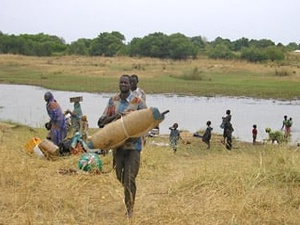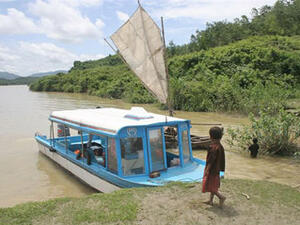Venezuela: Colombians flee paramilitary attacks
Venezuela: Colombians flee paramilitary attacks
A just-concluded UNHCR mission to the Venezuelan-Colombian border has reported the arrival of some 500 people who said they were fleeing paramilitary attacks in the Norte de Santander region of north-eastern Colombia. They are now seeking refugee status in Venezuela. The group, about 120 families, is currently in Zulia state on the Venezuelan side of the Rio de Oro (river) which forms the border with Colombia. After interviewing the Colombians, who clearly stated their desire to seek asylum, UNHCR staff from Caracas notified the Venezuelan government of the group's presence. UNHCR has offered to help provide assistance to the group as well as to participate in the determination of their status under Venezuelan asylum procedures. We are confident that the Venezuelan government will honour its commitment to safeguard the right of asylum and to examine requests for refugee status from these Colombians as well as others fleeing violence in their strife-torn country. Venezuelan officials reiterated this commitment in meetings earlier this year with Assistant High Commissioner Søren Jessen-Petersen.
Members of the newly arrived group said they fled the Colombian town of La Pista following an attack by paramilitary forces on August 22 that killed at least one man and forced between 1,000 and 1,500 people to flee. The 500 who fled to Venezuela said pursuing paramilitary troops continued firing at them and throwing grenades as they crossed the Rio de Oro river border to safety in Venezuela. They said the remaining population of La Pista, an area that had largely been under the control of the rebel Armed Revolutionary Forces of Colombia (FARC) until the middle of last year when paramilitary forces appeared, fled into the surrounding forests on the Colombian side. The new arrivals said the paramilitary troops shot and killed a local shopowner and warned townspeople that they would return to La Pista on Sept. 4 or 5 and would execute anyone still in business.
The deterioration of the Colombian conflict in the past few years has led to the internal displacement of at least 1.1 million people, nearly 600,000 of them in the last two years. Most of the displaced have remained in Colombia, although there have been relatively small numbers of people fleeing to neighbouring countries to seek asylum. UNHCR opened an office in Bogota in June 1998 and also has three field offices which are close to the borders with Venezuela, Panama and Ecuador. The first of the three field offices opened in November 1999 in the north-eastern city of Barrancabermeja, an oil port on the Magdalena River near Venezuela. The second opened earlier this year in Apartadó, in the northern region of Urabá near the border with Panama. The last office was officially opened in mid-August in Puerto Asís in the southern Putumayo region on the border with Ecuador.
UNHCR's programme in Colombia, with a budget this year of some $2 million, includes providing technical and financial support to the government and NGOs for humanitarian assistance for the internally displaced; advising the military and police on their obligation to provide security for IDPs; advice on contingency planning and early warning for emergencies; and identifying lasting solutions for the victims. UNHCR is also working in the surrounding countries to help strengthen asylum procedures and to provide assistance to refugees.





